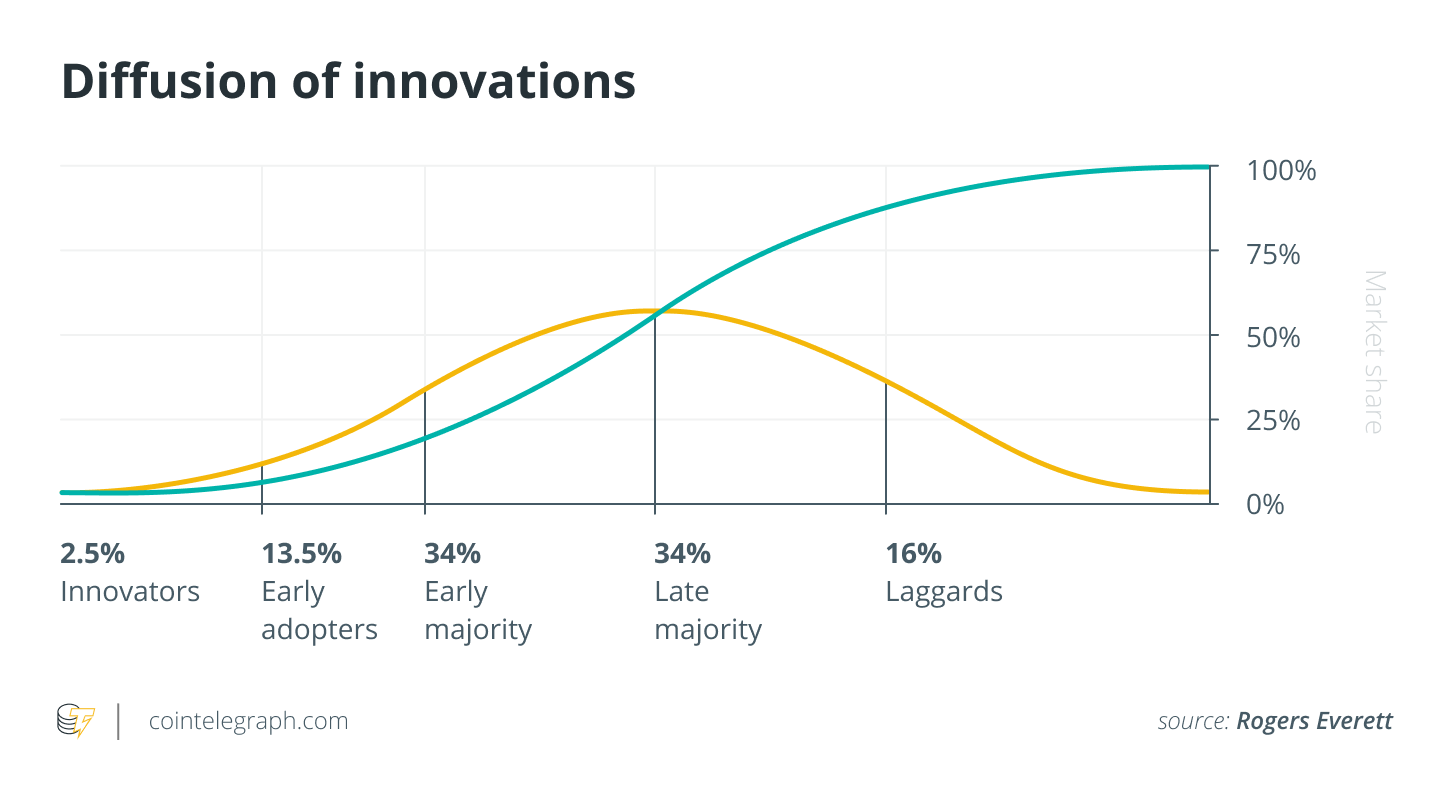Cointelegraph is following the development of an entirely new blockchain from inception to the mainnet and beyond through its series, Inside the Blockchain Developer’s Mind, written by Andrew Levine of Koinos Group.
Scalability is a popular topic in blockchain, but few ever explain what we mean by that term. When we at Koinos Group talk about scaling what we mean is scaling to the masses. Creating a blockchain that everyone on Earth can use. That means the blockchain network has to be able to support that level of load, which is typically what people mean when they refer to scalability.
User experience matters
But what they talk about far less is the obvious implication that you must have a user experience that everyone on Earth can find pleasurable. Terrible user experiences are infinitely scalable because there is no demand for bad user experiences and the underlying network resources required to deliver them.
Related: Searching deep: The quest for Bitcoin scalability through layer two protocols
This is demonstrated by the fact that when most projects talk about scaling, they talk about technical implementations like sharding, proof-of-history, or layer 2, which are the solutions that Ethereum is using to solve its scaling challenges.
These projects are responding to Ethereum’s scaling constraints by trying to integrate those scaling solutions sooner, but are failing to realize that those solutions only make sense in Ethereum’s context as not only the first general-purpose blockchain but the one with the most developer adoption in the world.
Ethereum: The first mover
When Ethereum was released, it gave developers, for the first time ever, the ability to develop applications on a shared blockchain platform using a programming language very similar to the ones they were already using to build applications; a Turing complete programming language. Compared to the developer experience of building applications on other blockchains, building on Ethereum was a quantum leap that made it faster, easier and cheaper to build decentralized applications. Thanks to this unparalleled user experience, the usage of Ethereum grew at a high rate. Demand for Ethereum’s resources has outstripped supply, which has led to an increase in demand for gas, and a corresponding price increase, making all Ether (ETH) holders very happy.
The Ethereum developers and stakeholders do not want to eliminate fees or even necessarily reduce them. That would be like oil producers wanting to reduce the price of oil. If there is surplus demand for their network resources, they don’t care about creating a better user experience, they care about increasing supply (scaling) while maintaining the existing user experience.
Related: Ethereum fees are skyrocketing — But traders have alternatives
But that is Ethereum! The 900-pound gorilla of general-purpose blockchains with first mover advantage, incredible developer adoption and unfathomable capital investment. It is a successful platform and its plans for scaling make perfect sense for Ethereum. But they make no sense for platforms that have no usage and no developer adoption.
This is why we see so many projects pursuing labor intensive and risky efforts like bridges to Ethereum in an attempt to siphon users off of Ethereum to trigger the growth they need to justify their scaling solutions!
Reasoning from analogy
But this is classic reasoning from analogy as opposed to reasoning from first principles; making decisions based on what everyone else is doing instead of focusing on the problem you want to solve and the most efficient path for developing a solution based on fundamental truths. Thinking that the way to scale a new blockchain is sharding because sharding is the way to scale Ethereum is a perfect example of reasoning from analogy.
At Koinos Group, we’re approaching this problem from first principles. Scaling to the masses is not about integrating some magical technology that overnight supports everyone and their mother. No technology platform ever goes from zero users to mass adoption overnight. Every platform or product that reaches mainstream adoption only ever achieved that through exponential growth. I’ll repeat that. Every product or platform reaches mass adoption through exponential growth.

What that means is that it doesn’t matter how many users or how many transactions your platform or application stack can handle on Day One. That is effectively irrelevant.
What matters the most is that your product has some unique value proposition that a small number of early adopters will love, even if the cost is relatively high. Koinos allows people to use decentralized applications for free simply by holding liquid KOIN tokens in their wallets. They don’t have to buy an account or consciously stake their tokens because every liquid KOIN token contains mana that is consumed down when they use the blockchain. As an account’s mana gets consumed, the tokens containing that mana are automatically locked for some time, creating an opportunity cost instead of an explicit fee.
Video game experience
This gives the blockchain a video game-like user experience, instead of the unpleasant UX of every other blockchain. This delivers a fundamentally different, and more pleasant user experience, but it’s not like the whole world is going to want to use Koinos on Day One. Ethereum’s fee-based model is still the dominant paradigm, which is only validated by its many imitators/competitors. It also has an army of developers, token holders and institutional investors advocating for it (and by extension, its fee-based model).
Related: Inside the blockchain developers’ mind: Building a free-to-use social DApp
On Day One, a relatively small group (hopefully, not too small) of early adopters looking for the next best thing will begin using Koinos. The mainnet needs to be able to give those people a pleasant user experience, but no more. As those people use the blockchain and discover that it truly has a delightful user experience, they will spread the word, and usage of the blockchain will go up.
At a certain point, the usage of Koinos will get high enough that the amount of a user’s tokens getting locked is very high and the new user experience relative to the original user experience might be unacceptable. This is what Koinos hitting its scaling constraints looks like. But bear in mind, the user is still not losing those tokens forever (a fee), they are only sacrificing some opportunity cost, which is an infinitely better user experience.
Upgradeability: The ultimate scaling solution
Koinos has to be engineered so that as adoption grows, the right scaling technologies can be integrated at the right time. This is why Koinos is not optimized for any particular scaling solution, but upgradeability in general, making it as easy as possible for new technologies to be added once they have been sufficiently battle-tested. This turns all of the other projects experimenting with scaling technologies prematurely into fertile testing grounds for Koinos!
Scaling is not an end goal, it’s a process that unfolds throughout the lifetime of a platform, at least, if the platform is sufficiently upgradeable. If the platform isn’t sufficiently upgradeable then you have to pick the “right” scaling solutions on Day One, even if you don’t need it, but this is more of a reflection of poor upgradeability (and bad engineering) than anything else.
This is why I like to say that upgradeability is the ultimate scaling solution.
This article does not contain investment advice or recommendations. Every investment and trading move involves risk, and readers should conduct their own research when making a decision.
The views, thoughts and opinions expressed here are the author’s alone and do not necessarily reflect or represent the views and opinions of Cointelegraph.
Andrew Levine is the CEO of Koinos Group, a team of industry veterans accelerating decentralization through accessible blockchain technology. Their foundational product is Koinos, a feeless and infinitely upgradeable blockchain with universal language support.



